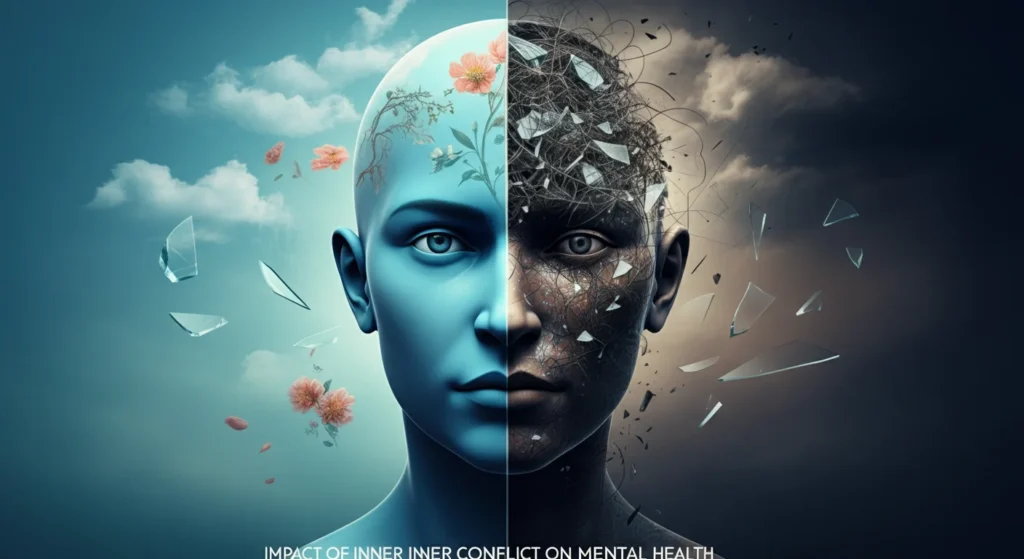Standing at life’s crossroads, you feel torn between security and passion, duty and desire, comfort and growth. This internal struggle has a name rooted in ancient wisdom: Antarvafna. This Sanskrit concept describes the profound inner battles we all face—conflicts that shape our identity, guide our decisions, and ultimately determine our path to self-discovery.
The modern world often emphasizes external challenges while overlooking the deeper conflicts within ourselves. Yet these internal struggles are where our most significant growth occurs. When we learn to understand and navigate our Antarvafna, we transform what feels like chaos into clarity, confusion into wisdom.
This exploration will help you recognize your inner conflict patterns, understand their psychological foundations, and develop practical strategies for turning these struggles into stepping stones toward a more authentic life.
Defining Inner Conflict: A Psychological Perspective

Inner conflict occurs when our thoughts, emotions, values, or desires contradict each other, creating psychological tension that affects our decision-making and well-being. Unlike external disputes with others, these battles happen entirely within our minds and hearts.
Psychologists recognize several forms of internal struggle. Cognitive dissonance arises when we hold conflicting beliefs or when our actions fail to align with our values. A person might believe in environmental protection while driving a gas-guzzling vehicle, creating uncomfortable mental tension.
Attachment theory also explains how early relationships influence our internal conflicts. Someone with insecure attachment patterns might simultaneously crave intimacy while fearing abandonment, leading to contradictory behaviours in relationships.
Defence mechanisms serve as unconscious strategies for managing these conflicts. We might rationalize poor choices, project our fears onto others, or completely deny uncomfortable truths about ourselves. While these mechanisms provide temporary relief, they often prevent genuine resolution of the underlying conflict.
The intensity of inner conflict varies dramatically. Minor indecision about lunch choices differs significantly from major life conflicts, such as career direction or relationship commitments. Understanding this spectrum helps us recognize when professional support might be beneficial.
Common Causes of Inner Conflict
Career decisions frequently trigger Antarvafna. Consider the art student facing family pressure to pursue a “practical” degree in business. The conflict between creative passion and financial security creates sleepless nights and endless self-doubt. This person struggles to balance their authentic self with societal expectations.
Work-life balance presents another common battlefield. An entrepreneur might desperately want business success while also craving quality time with family. The constant tension between professional ambition and personal relationships can lead to burnout, strained marriages, and feelings of inadequacy in both areas.
Ethical dilemmas in professional settings create particularly intense conflicts. When workplace demands clash with personal integrity, the resulting stress can be overwhelming. The pressure to achieve results while maintaining ethical standards forces difficult choices that affect both career advancement and self-respect.
Relationship decisions often involve competing values. Staying in a comfortable yet unfulfilling partnership versus risking loneliness for the potential of happiness creates profound inner turmoil. The fear of making the wrong choice can paralyze decision-making for months or even years.
Cultural and generational expectations add another layer of complexity. First-generation immigrants might struggle between honouring family traditions and embracing new cultural norms. These conflicts involve not just personal preferences but deep questions about identity and belonging.
Impact of Inner Conflict on Mental Health

Prolonged inner conflict has a significant impact on psychological well-being. The constant mental tension creates chronic stress, leading to anxiety disorders, depression, and physical health problems. When our minds are constantly battling themselves, our bodies bear the burden through headaches, digestive issues, and sleep disturbances.
Decision-making becomes increasingly complex as conflicts intensify. The paralysis of indecision affects work performance, relationship quality, and overall life satisfaction. Simple choices feel overwhelming when we’re already managing intense internal struggles.
Self-esteem suffers when we are unable to resolve competing demands. The inability to satisfy all aspects of ourselves creates feelings of inadequacy and failure. This negative self-talk reinforces the conflict cycle, making resolution even more challenging.
Relationships often bear the brunt of unresolved inner conflict. When we’re struggling internally, we might project our confusion onto partners, become irritable with friends, or withdraw from social connections altogether. The isolation that follows only intensifies the original conflict.
However, recognizing these impacts represents the first step toward healing. Inner conflict isn’t inherently destructive—it becomes problematic only when we ignore or fail to manage it effectively. With a proper understanding and the right tools, these struggles become opportunities for growth rather than sources of suffering.
Coping Strategies for Managing Inner Conflict
Self-awareness forms the foundation of effective conflict management. Regular self-reflection through journaling helps identify patterns in your thoughts and emotions. Write about your daily struggles without judgment, focusing on understanding rather than solving. This practice reveals the underlying values and fears driving your conflicts.
Mindfulness techniques offer powerful tools for managing immediate distress. Deep breathing exercises calm the nervous system during intense internal battles. Meditation helps you observe conflicting thoughts without becoming overwhelmed by them. These practices create space between you and your conflicts, reducing their emotional intensity.
Professional support offers a valuable perspective during challenging times. Therapists trained in cognitive-behavioural therapy can help identify thought patterns contributing to inner conflict. They provide objective viewpoints and proven strategies for resolution. Don’t hesitate to seek help when conflicts significantly impact your daily functioning.
Breaking large conflicts into smaller, manageable pieces makes progress possible. Instead of trying to resolve career dissatisfaction all at once, focus on one aspect, like updating your resume or exploring a new skill. Small actions build momentum and confidence for larger, more significant changes.
Trusted friends and mentors offer essential support during challenging periods. Share your struggles with people who know you well and can provide honest feedback. Sometimes, external perspectives reveal solutions that aren’t visible from inside the conflict.
Turning Inner Conflict into Personal Growth
Reframing inner conflict as a growth opportunity transforms the entire experience. Instead of viewing struggles as problems to be eliminated, consider them as signals pointing toward essential life changes. The discomfort indicates that you’re outgrowing current circumstances and ready for evolution.
I once faced a difficult choice between job security and entrepreneurial dreams. The sleepless nights and constant worry felt unbearable at the time. However, working through this conflict helped me clarify my core values and risk tolerance. The process, though painful, led to greater self-understanding and ultimately a more fulfilling career path.
Setting achievable goals constructively helps channel conflict energy. If you’re struggling with work-life balance, start with small changes, such as leaving the office on time twice a week. Success in small areas builds confidence for addressing larger issues.
Self-compassion plays a crucial role in growth. Treat yourself with the same kindness you’d offer a good friend facing similar struggles. Inner conflict is part of the human experience—you’re not broken or inadequate for experiencing it. This gentleness creates the psychological safety needed for genuine change.
Celebrate progress rather than perfection. Each step toward resolution deserves recognition, even if you haven’t reached your final destination. Acknowledging growth maintains motivation during the inevitable setbacks that accompany significant life changes.
Faq About Antarvafna
What exactly does “Antarvafna” mean?
Antarvafna is a Sanskrit term combining “antar” (inner) and “vafna” (conflict or battle). It describes the internal struggles between competing thoughts, emotions, values, or desires that shape our psychological experience.
How does inner conflict affect daily life?
Inner conflict influences decision-making, relationship quality, work performance, and overall well-being. It can create anxiety, decision paralysis, and physical symptoms like headaches or sleep disturbances.
What are some practical steps to embrace Antarvafna and manage inner conflict?
Start with self-awareness through journaling and mindfulness practices. Break large conflicts into smaller, manageable pieces. Seek support from trusted friends or professionals. Practice self-compassion throughout the process.
Can managing inner conflict really lead to significant life changes?
Yes, working through inner conflict often catalyzes major life transformations. The process clarifies values, reveals authentic desires, and builds courage for making necessary changes.
What role does self-awareness play in resolving inner conflict?
Self-awareness is fundamental to conflict resolution. Understanding your thought patterns, emotional triggers, and underlying values provides the foundation for making conscious choices rather than reacting automatically.
When should one seek professional help for inner conflict?
Consider professional support when conflicts significantly impact daily functioning, relationships, or mental health. Persistent anxiety, depression, or inability to make important decisions warrant therapeutic intervention.
Embracing Your Inner Journey
Antarvafna represents more than just internal struggle—it’s a doorway to deeper self-understanding and authentic living. The conflicts you experience aren’t obstacles to overcome but invitations to grow beyond your current limitations.
Every internal battle offers valuable information about your evolving values, changing priorities, and emerging potential. When you stop fighting these conflicts and start listening to their messages, you discover that struggle itself can become your greatest teacher.
The path through inner conflict requires courage, patience, and self-compassion. You don’t need to have all the answers immediately or resolve everything perfectly. Growth happens gradually, through small daily choices that honor your authentic self while navigating life’s practical demands.
Remember that you’re not alone in this journey. Every person who has ever lived has faced their own version of Antarvafna. By embracing your inner conflicts with curiosity rather than judgment, you join the countless individuals who have transformed struggle into wisdom, confusion into clarity, and conflict into connection with their truest selves.


